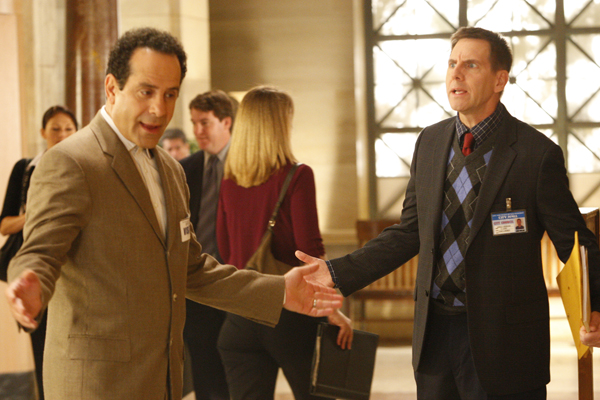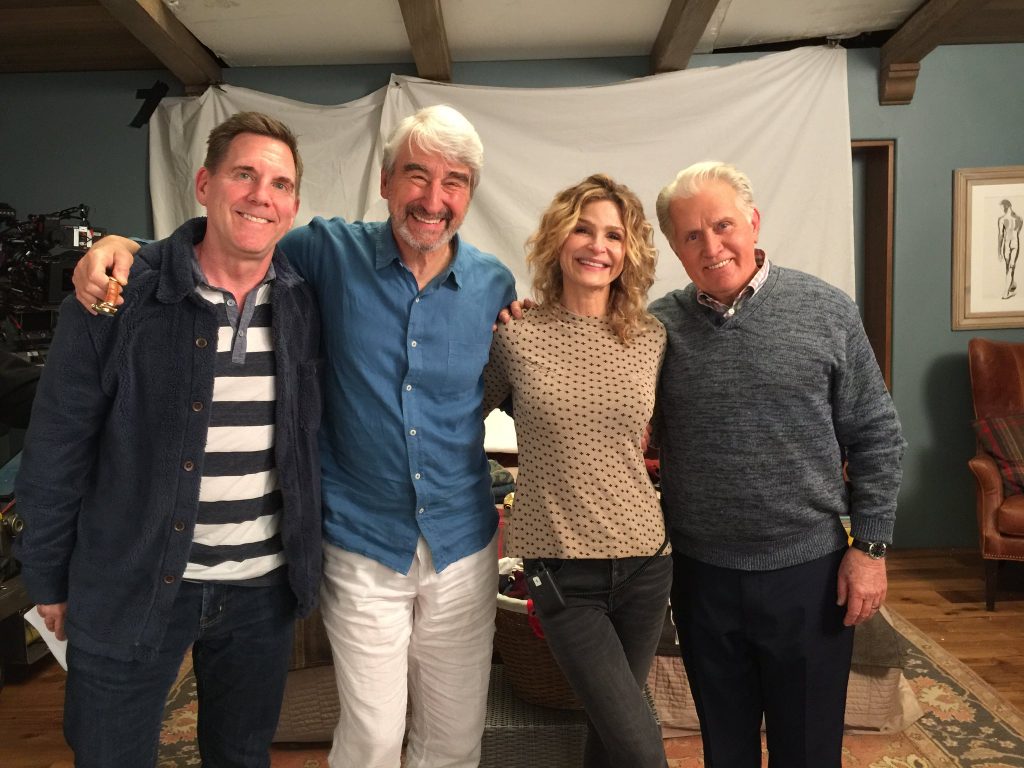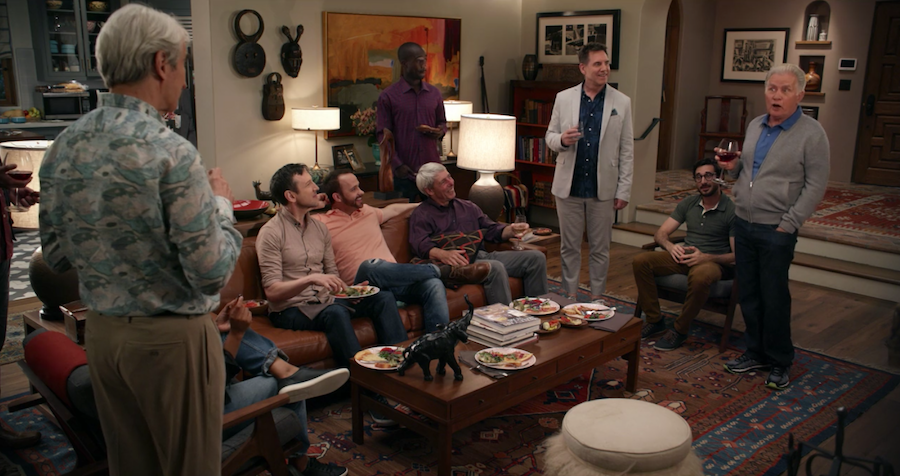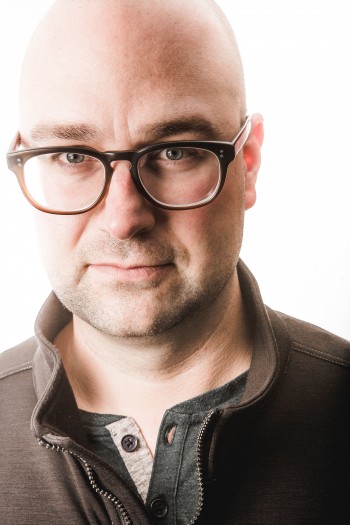Open up Tim Bagley’s list of TV and film credits and it might just unroll to your feet. Tim Bagley has been working on stage and screen for decades and with good reason: he’s serious about comedy—and acting in general. I met Tim in 2015 on the set of Teachers where he played Principal Pearson and he was kind enough to chat with me recently about his career and his approach to acting. The following is an edited transcript of our conversation.

MM: A lot of the actors reading this interview have had some experience acting on stage but might be rather new to working on camera. Jumping back and forth between those two mediums can be challenging even for more experienced actors. You have worked both on stage and on camera at the highest levels. How do you calibrate your choices as an actor—especially for camera work?
TB: The thing about camera work is that so much of it is internalized. I think just good acting, in general, is internalized, you have to be connected to your interior emotional life. I just remember that when I was working with the Groundlings and when I do theatre now I’m thinking more physically, externally. How do I make sure that everybody in the back row can see what I’m doing physically? When you’re working on camera, the camera really picks up everything…the camera will show what you’re thinking if it’s there internally…you don’t have to show or indicate—ever.
MM: You mentioned the Groundlings. I know you studied and performed there for years. What drew you to improvisation?
TB: I was having trouble early on in my career kind of imagining myself in varied roles, like as a king, you know? Characters and scenarios that were not at all like me. One of my teachers, Nina Foch, encouraged me to go study improv with the Groundlings where I wouldn’t have time to think about it. In sketch comedy and with the Groundlings especially you kind of instantly put a character on. If somebody labeled you as psychopath in a scene why then you just had to be a psychopath instantly. It was really good for me to just learn how to be in the moment and go with whatever was happening. In scene study classes you often have to work to just learn how to be present, but in improv you have no choice. It just forces you to be present and in the moment.
After the Groundlings, I started studying with Howard Fine and he taught me how to find the character within myself, so that I’m not thinking in terms of externally putting something on to hide myself, but rather revealing part of myself in the character. And I’m still studying right now in fact; I’m taking a class with Helen Hunt. I’m always trying to get better. That’s our responsibility as actors. I’m always trying to push myself beyond my comfort level.
MM: Do you have any rituals as an actor? Anything you do before an audition or before shooting a scene to help ground you?
TB: I mean the main thing for me is just doing my preparation. I go through my process of breaking a scene down, knowing what I am fighting for, knowing what I want, knowing what obstacles are in my way. I always have a Moment Before that I try to ground in some kind of physical truth. Then it’s imperative to memorize the lines so I know them backwards and forwards. So then when you’re on set with all the things going on they don’t distract you. You know what you’re doing and you’re not thinking about your next line, you’re just able to be present. You can look at your scene partner and just respond to them. I just always want to be as prepared as I can possibly be.
MM: Shoot days on a film or a TV show as an actor can be both exhilarating and exhausting, seemingly endless one moment and then lightning fast the next. What have you learned about staying ready and/or passing the time on set? Any tips?
TB: Ha! Yes! It’s really hard if you have a big emotional scene and you think it’s coming up in like ten minutes so you go ahead and get yourself into that emotional place and then it’s actually like three hours later that they call you. And you can’t really stay in that emotional state for three hours. So I always ask to have the 2nd AD or a PA give me like a half an hour heads up before I have to go on set so I have a sense for the timing of the production. I work with whoever I have access to in order to make sure I get a heads up. That’s my one tip. There’s nothing worse than being called to set when you’re not prepared.
MM: Can you talk about your relationships with casting directors? What are some things early career actors should keep in mind as they are going out for auditions and meeting CD’s?
TB: I remember a feeling early on that they were just miles apart from me. But they’re a lot like actors. They have to basically audition or interview for their jobs and there’s a lot at stake for them when they bring people in and show them to a director.
What I always try to do when I’m going in to meet a casting person is to really come in prepared. I want them to know that I’ve got their back. Not by saying that to them, but by going in and turning out a good audition. It’s the best way you can insure a future relationship with that casting director.

The other thing is, casting directors are people and they have their problems…problems that are work related, problems with the producers, problems with the writers. They’re people who are just trying to present themselves well. Like actors.
MM: Do you watch your work? I know some actors who don’t ever watch the finished film or TV show they are in.
TB: I usually do watch it. I watch it to learn and to grow. I remember Elizabeth Taylor one time saying she never watches her work and I thought to myself “Huh, maybe if she did she wouldn’t have pushed as much as she did.” [Laughs]
One time my niece said to me, “Uncle Tim, why is it whenever you’re on TV your eyes always bug out?” So I watched for that and I noticed that she was right. So I had to learn how to kind of relax my eyes and not work as hard. I just think if you watch your work you can learn from your mistakes.
[Laughs] Oh! Also, there was this one time I was on an episode of V.I.P. and I was playing an international terrorist serial killer and I came into the scene with a huge gun with a silencer on it. And I remember thinking, “well, I’ve got to show the crazy eyes.” But then when I saw it played back and it was so over the top and ridiculous and I thought, “Tim if you’ve got a gun with a silencer on it, all you have to do is walk into the room. They’re going to be scared. You don’t have to show them that you’re dangerous. You don’t have to show them crazy eyes. Just be calm. The gun will do all the work.” So yeah, you learn stuff like that from watching your bad performances.

One other experience of watching my work recently, there was a scene on Grace & Frankie when a guest director came in, Kyra Sedgwick, and she told me we’re going to shoot a scene where your character is smoking a hookah. She wanted to know if I could inhale and blow smoke rings. And I told her I’ve never done smoke rings, but I have four days. So, I went to a couple of hookah bars on Melrose and asked people there and they showed me how to do it and I practiced. And then when I went to set I blew some rings and she was like “How did you do that?!” And I told her I went to some hookah bars to learn and she was so impressed, but the truth is: that’s an actor’s job. If they tell you they want to see you do this, it’s your responsibility to learn how to do it. I’ve learned how to do so many things because of acting jobs.
MM: That’s part of the joy of acting, really, isn’t it? Delving into parts of life you might not have explored otherwise.
TB: Yes, it absolutely is. And I watched that scene because I wanted to see how it looked. And sure enough, it looked really good. It looked like I had been smoking hookahs all my life!
MM: That’s so great. You have worked with an impressive array of actors over the years. Any favorite scene partners? Anyone you love working with because of how they challenge you in a scene?
TB: I’ve had so many and I know people always say that, but I just love actors and I find something joyful in playing with every one of them.

I will say one experience I had, and I never really talk about this, but when I worked with Tony Shalhoub on Monk…it was my first episode on the show and I was only supposed to guest star once. He just made me feel like a million bucks, like I was just gold. We improvised a little and I could see him laughing and to see him laughing meant so much to me. And they kept calling me back for more episodes and every time we had a scene together Tony would say ”Can we improvise a little here?” And I found out later that there really was no other improvisation in that show; I think he just enjoyed our playful exchange. What I took away from that was how he made me feel. He made me feel like I was an extraordinary actor and I just think it’s so important that when we play with people we make sure that they know we appreciate what they’re doing. Tony is such a classy man and just a brilliant actor. He was constantly surprising me, and it would make me step up to his level and try to surprise him. It was thrilling to play a scene with him. But again, the big takeaway was just the way that he treated me. It meant everything to me. And I just always think about that when I’m working with other actors now.
MM: I can say from my experience watching you work on Teachers that you have most definitely passed that good energy forward. All the Katydids loved being in scenes with you.

TB: Thank you. We had the best time on that set!
You can see Tim Bagley in the final season of Grace & Frankie coming out on Netflix this summer.

Originally from Kent, Ohio, Matt Miller is a Chicago-based director and producer.
As a commercial director, recent credits include work for Eggo, America’s Best Eyeglasses, Black Flag, AT&T, Seeso, Hyundai, Crest, and The Hartford.
An accomplished stage director as well, Matt’s credits include Irish Theatre of Chicago’s production of The Seafarer (nominated for 5 Joseph Jefferson Awards, WINNER for Best Ensemble), The Killer Angels with Lifeline Theatre (WINNER Joseph Jefferson Award for Sound Design), Superior Donuts with Mary-Arrchie Theatre Co., and Oblivion for Steppenwolf’s First Look Repertory.
Take a look at Matt’s workshop, Find The Funny: Commercial Workshop with Matt Miller: In Person! Learn how to identify the funny in commercial copy and target the best places to improvise from one of the best in the industry!


